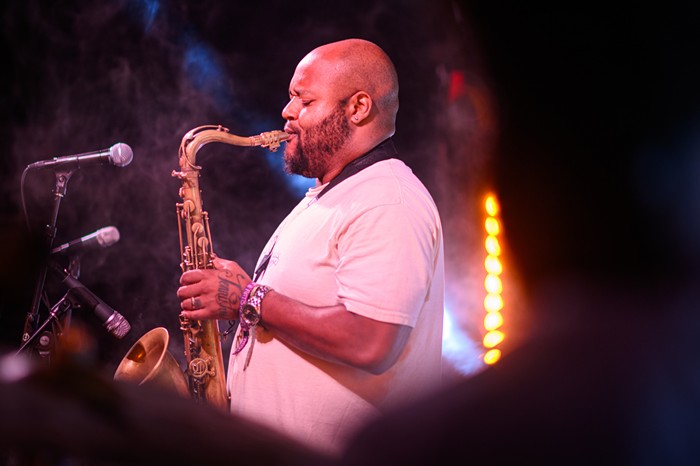STUDIO RATS, TAKE NOTE: Ryley Walker's new album, Primrose Green, was recorded in a single day.
It's no basement four-track doodle, either. It's a majestic, fully realized recording that's stunning from bottom to top—from Walker's impressionistic, smoky songs to his fluidly fingerpicked acoustic guitar; from his band's almost telekinetic interplay to the crystal-clear recording that fully immerses you in the music. It's rare to get goosebumps from a compressed Spotify stream and a pair of tiny earbuds, but Primrose Green will do it to you. A clean vinyl copy on big speakers is nothing short of a revelation.
It's worth mentioning that Walker and his fellow musicians didn't walk into Chicago's Minbal studio cold. "When the first record came out," Walker says, referring to his debut, 2014's All Kinds of You, "as we were touring last year, we played songs from Primrose Green. So we already knew 'em inside and out. We had played those songs, like, 200 times live when we went to the studio. I'd booked three days, but we finished it in one, and I was like, okay, cool."
Still, a wealth of spontaneity remains on Primrose Green. Walker never sings a song the same way twice, and the musicians he works with are seasoned improvisers in the Chicago jazz scene. "They just rip," says Walker, "so there's a lot of jamming on the record. That's why it was so immediate. A lot of it is first takes and a lot of first-thought, best-thought sort of jams, and that definitely comes from a lot of jazz traditions."
The final product, right down to the verdantly green double-exposure on the album cover, brings to mind Van Morrison's Astral Weeks, which was recorded with similar expediency with jazz musicians, who similarly turned Morrison's Celtic folk into something golden and otherworldly. There's no shortage of other comparisons in Walker's press notices, either, from the Tim Buckley-esque quality of his elastic voice to the Bert Jansch-like cascade of notes he summons from the guitar.
But there's a heavier, darker element at play in Walker's work, and his musical background suggests there's more going on than connecting the dots to titans of the '60s and '70s. "I was in jazz band all through high school, but I wouldn't call myself a jazz guitarist," he says. "I mostly did punk bands and noise bands. The first few times I went to Portland, I was in amplifier-assault-noise-band kind of things. And a lot of that was like jamming and just doing weird, loud shit and making it up as we went.
"There's a whole world where noise and acoustic guitar meet. I got really into Jack Rose when I was like 16, 17. He came from Pelt, which was a noise band. Those worlds, and that whole—I don't want to call it a wave or scene, I don't know what to call it. But that early- to mid-2000s thing with, like, Wooden Wand and Espers, all those bands. They would do gigs and there would be a brutal noise band like No-Neck Blues Band, and then Hushed Arbors would play some really nice sweet tunes. I was really influenced by all that stuff, and they kind of let these two worlds collide—experimental music and folk."
Talking to Walker, it's clear that discovery and experimentation remain paramount. And on this short West Coast jaunt with Amen Dunes, which sees Walker performing solo, he'll play new songs that he's planning to record over the summer for an album that'll come out next year. "I think it's more fun at this point to work on new stuff," he says. "It makes for a cooler show, I think. It's not like I'm Zeppelin and I didn't play 'Stairway.'"
He'll return with a full band later this year for Pickathon. In the meantime, we have Primrose Green, an astonishing document of a very good day in the studio. The title track is a breath-taker, a breeze-powered laze down a winding stream surrounded by lush forests on either side. "Sweet Satisfaction" turns from a loose strummer into a red-eyed trip into the void, accompanied by demonic fuzz guitar and freakout polyrhythms. "Summer Dress" is a boho-jazz amble—complete with shimmering, ice-cool vibraphone—that accumulates a volcanic amount of intensity. And in "On the Banks of the Old Kishwaukee" (a reference to Walker's hometown of Rockford, Illinois), folky twang wraps itself around the listener like a favorite blanket.
Anyone else would use this album as a strict blueprint for note-perfect (and potentially lucrative) live performances. Walker isn't interested in that. The moments of discovery—and that walk on the knife's edge between success and failure, musically speaking—is what excites him and keeps him improvising.
"It gets easier as time goes on," he says, "because you get better, but then you can also fall into this comfort zone, which defeats the whole purpose of improvisation and experimenting. Yeah, there are definitely times when you fall flat on your ass, and I still do that. I don't think I get better at improvising, necessarily—I just get better at recovering from falling flat on my ass, because that's almost a guarantee. Recovering from falling on your ass is an important lesson to learn."



















